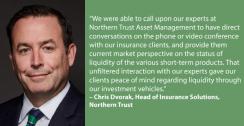Through sophisticated scenario modeling, insurers do their best to anticipate nearly any event that could occur, including pandemics, and prepare for the possible effects on their clients’ and their own businesses. Even the most resilient plans face significant challenges at moments of crisis, however. When COVID-19 and its accompanying economic volatility picked up steam in March, the asset management teams at insurers were caught in the maelstrom. The ensuing strain underscored the importance of strong and reliable third-party partners.
It’s well worth remembering, notes Chris Dvorak, Head of Insurance Solutions, Northern Trust, that all of the initial pandemic-related market chaos took place with the end of the first quarter looming, and when colleagues and partners at firms of every stripe were just beginning to work remotely on a mass scale. Transparency was especially critical during the early days of the pandemic and the spike in market volatility. For Northern Trust, that meant increased communications with clients and partners on multiple aspects of its business – where evolving solutions stood, how systems were performing, and how partners were managing new work environments.

“We were seeing multiples of average trading volumes for a series of consecutive days due to market volatility,” says Dvorak. “There was a lot of stress on our clients to know exactly where their balance sheet stood heading into quarter end. Don’t forget interest rates were 100 basis points or so below where they were the year before, prompting some asset managers to trade into riskier markets in an effort to achieve benchmark returns. All of this was happening with everyone working from home and depending heavily on technology while at the same time, some were investing in a new asset class for the first time, or experiencing new flows, or struggling with valuations on illiquid assets such as private investments.”
Power in partnership
For insurers in particular, market volatility and the impact on their portfolios from a P&L perspective require a proactive look at asset impairments and potential credit losses so they can stay ahead of the curve. Such intense scrutiny heightens the attention on accurate quarterly reporting. Other situations could arise where investment teams may need to revise trading limits due to material shifts in valuations in the various types of securities they trade. In all cases, it’s paramount that investment teams are able to keep an eye on the key indicators of their portfolios, the valuations, and what’s being traded.
Working with a knowledgeable asset servicer such as Northern Trust can provide benefits to insurers’ investment teams through services such as integrated investment management, middle- and back-office operations, capital markets capabilities, and portfolio management support. For example, with liquidity in high demand and of major concern during the height of the March challenge, Dvorak and his team were able to call upon experts at Northern Trust Asset Management to “have direct conversations on the phone or video conference with our insurance clients, and provide them current market perspective on the status of liquidity across various short-term products. That unfiltered interaction with our experts gave our clients peace of mind regarding liquidity through our investment vehicles,” says Dvorak.
The conversations Dvorak describes magnify the importance of what an insurer should look for while performing due diligence on potential partners. “An insurer should have a deep understanding of the relationships and capabilities they can draw on more widely from a third-party firm, including financial strength to not merely survive a financial crisis, but to come out thriving on the other side,” Dvorak adds.
Vital role of technology
It’s difficult to overestimate the role technology played and continues to play in businesses successfully operating throughout the pandemic. Northern Trust invests consistently in technology that its partners can access to run their businesses more efficiently. Not all asset management teams are fully automated in terms of communication – some, in fact, still rely on fax machines on a regular basis. Firms who don’t have up-to-date and automated systems learned a hard lesson that they need to move in that direction. The firms that were up to speed reaped the rewards.
“We heard widely from our clients that during the initial onset of working from home their interactions with our teams were seamless,” says Dvorak. “They couldn’t even tell that we had thousands of people working out of their homes to execute on their business processes, all performing just as if they were in the office. That’s a testament to our technology leadership and how we executed when the stakes were highest.”
The heightened reliance on technology propelled data security to the forefront of many conversations. “With everyone accessing their networks from locations outside the office, it’s added another layer of potential penetration for bad actors,” says Dvorak. “That heightens the importance of working with service partners that have strong policies and technology controls in place to have assurance that your data is secure.”
Other knock-ons from the pandemic that insurers should be preparing for include tax and regulatory implications, likely to include further disclosures based upon the impact of the pandemic on their business and in their financial statements, risk factors that were addressed, and impairments across debt and liquidity.
“Insurance companies will have to do a review and analysis of their risk factors going into the pandemic,” says Dvorak. “And we know that the state insurance regulators and the NAIC [National Association of Insurance Commissioners] are going to be meeting with the medical and consumer market experts about the pandemic. NAIC will eventually be providing direction of what will need to be documented and disclosed at state, federal, and international level. It’s safe to assume that transparency into how companies handled the pandemic will most likely result in additional disclosures required by insurance companies.”
Such additional responsibilities piled atop what asset management teams at insurers already do are why effective partnerships can be game changers. Just one week before U.S. businesses went full-on work from home, Northern Trust conducted a global trial of every employee working remotely – a test of a global shutdown. This was part of its normal business continuity exercises, but the vast majority of the industry only performs this test on a regional level.
“Executing our business resiliency test on a global scale is the best way to effectively validate system performance during every hour of the 24-hour trading day. While our teams in EMEA were still finishing their day, we were in the middle of the day in the U.S., and that’s where we have our greatest volumes,” says Dvorak. “It worked without a hitch.” Demonstrating that at Northern Trust, work is always underway to be as resilient and reliable a partner as possible.
Learn more about how to manage your growing investment, regulatory, and operational needs.
© 2020 Northern Trust Corporation. Head Office:50 South La Salle Street, Chicago, Illinois 60603 U.S.A. Incorporated with limited liability in the U.S. Products and services provided by subsidiaries of Northern Trust Corporation may vary in different markets and are offered in accordance with local regulation. This material is directed to professional clients only and is not intended for retail clients. For Asia-Pacific markets, it is directed to expert, institutional, professional and wholesale clients or investors only and should not be relied upon by retail clients or investors. For legal and regulatory information about our offices and legal entities, visit northerntrust.com/disclosures. The following information is provided to comply with local disclosure requirements: The Northern Trust Company, London Branch; Northern Trust Global Investments Limited; Northern Trust Securities LLP. Northern Trust Global Services SE, 10 rue du Château d’Eau, L-3364 Leudelange, Grand-Duché de Luxembourg, RCS B232281; Northern Trust Global Services SE UK Branch, 50 Bank Street, London E14 5 NT; Northern Trust Global Services SE Sweden Bankfilial, Ingmar Bergmans gata 4, 1st Floor, 114 34 Stockholm, Sweden; Northern Trust Global Services SE Netherlands Branch, Viñoly 7th floor, Claude Debussylaan 18 A, 1082 MD Amsterdam; Northern Trust Global Services SE Abu Dhabi Branch, registration Number 000000519 licenced by ADGM under FSRA # 160018. The Northern Trust Company Saudi Arabia, PO Box 7508, Level 20, Kingdom Tower, Al Urubah Road, Olaya District, Riyadh, Kingdom of Saudi Arabia 11214-9597, a Saudi Joint Stock Company – Capital 52 million SAR. Regulated and Authorised by the Capital Market Authority License # 12163-26 CR 1010366439. Northern Trust Luxembourg Management Company S.A., 6 rue Lou Hemmer, L-1748 Senningerberg, Grand-Duché de Luxembourg, Société anonyme RCS B99167. Northern Trust (Guernsey) Limited (2651)/Northern Trust Fiduciary Services (Guernsey) Limited (29806)/Northern Trust International Fund Administration Services (Guernsey) Limited (15532) Registered Office: Trafalgar Court, Les Banques, St Peter Port, Guernsey GY1 3DA.




